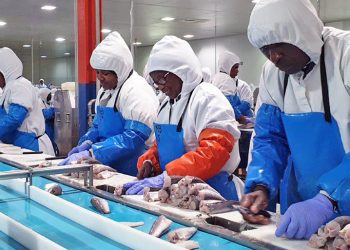
The proposed implementation of the Carbon Border Adjustment Mechanism (CBAM) by the European Union could significantly impact Namibia’s export-dependent economy, experts say.
The CBAM is the world’s first planned carbon tax on imported goods, aimed at curtailing the flow of “dirty commodities” into the European market.
Market watchers say the move, driven by environmental concerns, could have far-reaching consequences for Namibia, where European nations account for an average of 20% of imports.
Angelique Bock, a researcher at Simonis Storm, said the impending CBAM could hit two critical sectors of Namibia’s economy – fishing and mining – and see a marked GDP decrease.
“Namibia’s strong mining sector and foreign interest in the sector promise the country positive results. As the world moves into a just energy transition, the rare earth metals potential in Namibia can offer the country a higher expected export bill. The country, however, still faces the challenge of lack of manufacturers,” Bock told The Brief.
Namibia’s export basket to Europe has been steadily growing, increasing from N$8.5 billion in 2015 to N$12.5 billion in 2023, with the highest peak in 2022 at N$19.4 billion.
“Our exports to the European market represent a substantial portion of our total export revenue, constituting approximately 20% of our overall export portfolio. YTD figures for 2023 show this share has slightly increased to 21%. It is imperative to recognize that this export dependency introduces vulnerabilities, particularly for our fishing and mining industries,” Bock said.
Within Namibia’s export basket to Europe, minerals extracted in the mining sector constitute a significant 44% share, while fish products account for 25% of the total exports to this region.
Together, the researcher said these sectors make up 68% of Namibia’s total exports to Europe and contribute approximately 14.6% to the entire export earnings of the country.Â
However, a potential disruption looms on the horizon, driven by the Eurozone’s deliberation on a comprehensive ban on “dirty commodities.”
“In the case of our fishing industry, the reliance on fuel is paramount. Fishing vessels, as well as the transportation and supporting equipment within this sector, depend heavily on fuel consumption. The necessity to maintain a cold chain during the transportation of fish further exacerbates this reliance on fuel, making the entire process of fishing, preservation, and delivery susceptible to the ‘dirty’ label,” Bock said.
Similarly, the mining sector mirrors this vulnerability due to its substantial fuel dependence.
“The extraction processes involved in mining, as well as the subsequent transportation of mined materials, rely extensively on fuel usage. Consequently, both the fishing and mining sectors face exposure to potential adverse consequences if the Eurozone proceeds with the ban on ‘dirty commodities’,” Bock said.
She said considering the expected impact, Namibia needs to diversify its economic dependence on the sectors, taking into consideration increased environmental concerns.
“Namibia’s export dynamics, particularly in relation to Europe, warrant careful consideration. A substantial portion of the country’s export revenue is concentrated in sectors vulnerable to regulatory changes targeting “dirty commodities. Recognising these vulnerabilities and exploring strategies for diversification and sustainability within these sectors will be crucial for Namibia’s economic resilience in the face of evolving global trade regulations and environmental concerns,†she said.
The CBAM regulation would require importers of certain energy-intensive goods to pay a levy in respect of their imports that corresponds to the price of emissions allowances under the EU Emissions Trading System.
Reporting obligations under the CBAM will apply starting from October 1, 2023, while the obligation for importers to pay a levy will kick in as of 2026.










